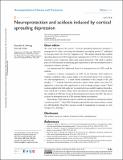| dc.contributor.author | Chan, Suk-tak | |
| dc.contributor.author | Kwong, Kenneth K | |
| dc.date.accessioned | 2017-03-28T15:56:42Z | |
| dc.date.available | 2017-03-28T15:56:42Z | |
| dc.date.issued | 2016-12 | |
| dc.date.submitted | 2016-10 | |
| dc.identifier.issn | 1178-2021 | |
| dc.identifier.uri | http://hdl.handle.net/1721.1/107754 | |
| dc.description.abstract | We read with interest the article “Cortical spreading depression produces a neuroprotective effect activating mitochondrial uncoupling protein-5” published in Neuropsychiatr Dis Treat by Viggiano et al.1 The authors showed that cerebral spreading depression (CSD) triggered uncoupling protein-5 (UCP-5),1 which had been reported to exert a long-term effect upon neuron protection.2 The result is another piece in CSD literature on modifying gene expressions to provide neuroprotection to subsequent ischemic episodes.3,4 | en_US |
| dc.language.iso | en_US | |
| dc.publisher | Dove Medical Press | en_US |
| dc.relation.isversionof | http://dx.doi.org/10.2147/ndt.s125677 | en_US |
| dc.rights | Creative Commons Attribution-NonCommercial 3.0 Unported | en_US |
| dc.rights.uri | https://creativecommons.org/licenses/by-nc/3.0/ | en_US |
| dc.source | Dove Medical Press | en_US |
| dc.title | Neuroprotection and acidosis induced by cortical spreading depression | en_US |
| dc.type | Article | en_US |
| dc.identifier.citation | Kwong, Kenneth, and Suk-tak Chan. “Neuroprotection and Acidosis Induced by Cortical Spreading Depression.” Neuropsychiatric Disease and Treatment Volume 12 (2016): 3191–3194. | en_US |
| dc.contributor.department | Harvard University--MIT Division of Health Sciences and Technology | en_US |
| dc.contributor.mitauthor | Kwong, Kenneth K | |
| dc.relation.journal | Neuropsychiatric Disease and Treatment | en_US |
| dc.eprint.version | Final published version | en_US |
| dc.type.uri | http://purl.org/eprint/type/JournalArticle | en_US |
| eprint.status | http://purl.org/eprint/status/PeerReviewed | en_US |
| dspace.orderedauthors | Kwong, Kenneth; Chan, Suk-tak | en_US |
| dspace.embargo.terms | N | en_US |
| mit.license | PUBLISHER_CC | en_US |
